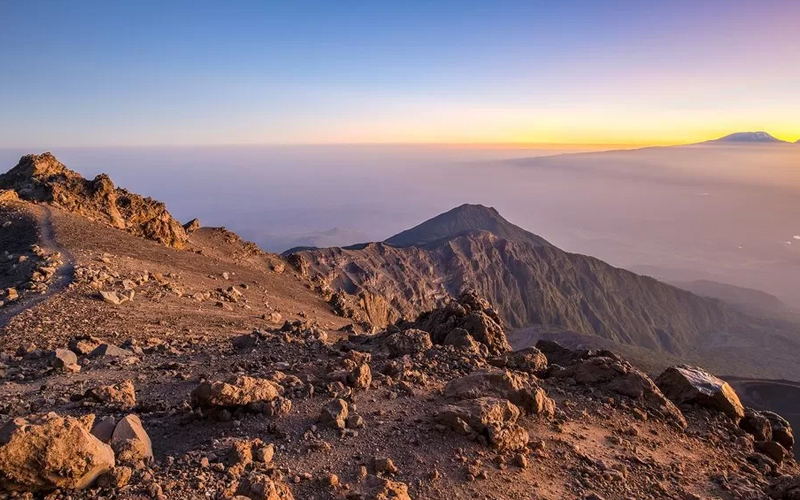Climate Change Mount Meru Treks Tanzania 2024
Mount Meru, Tanzania’s second-highest peak, offers breathtaking trekking experiences and stunning views of Mount Kilimanjaro. However, the growing impact of climate change is transforming this iconic trekking destination, challenging both its natural ecosystem and the trekking experience. From unpredictable weather patterns to the degradation of flora and fauna, understanding these changes is essential for preserving Mount Meru as a premier trekking destination.
Key Climate Change Impacts on Mount Meru Treks
- Unpredictable Weather Patterns: One of the most noticeable effects of climate change is erratic weather. Trekkers on Mount Meru are increasingly encountering unexpected rainfall, sudden temperature drops, and prolonged dry spells. These unpredictable conditions make trekking more challenging, requiring better preparation and gear. Additionally, the once-clear skies, perfect for stunning views of Kilimanjaro and the surrounding plains, are often obscured by haze and cloud cover caused by shifts in weather patterns.
- Melting Glaciers and Water Scarcity: Although Mount Meru does not have glaciers like Kilimanjaro, the mountain’s ecosystem is dependent on consistent rainfall and the surrounding water sources. Climate change has led to reduced rainfall in some seasons and longer drought periods, impacting streams and springs that provide water to trekkers and wildlife. This scarcity is affecting the trekking infrastructure and the wildlife that relies on these water sources.
- Loss of Biodiversity: Mount Meru is home to diverse ecosystems, ranging from montane forests to alpine meadows. Climate change is threatening this biodiversity by altering habitats and pushing species to adapt or migrate. Trekkers may notice fewer sightings of animals such as colobus monkeys, bushbucks, and birds that thrive in cooler, wetter climates. The shift in vegetation zones also impacts the scenic beauty of the trek.
- Increased Risk of Forest Fires: Extended dry seasons caused by climate change have heightened the risk of forest fires in Arusha National Park, which encompasses Mount Meru. These fires not only destroy vegetation but also disrupt the delicate balance of the ecosystem. For trekkers, this means closures of trekking routes during fire-prone seasons and long-term damage to the trails.
Adapting Mount Meru Treks to Climate Change

- Improved Trekking Infrastructure: To counter the challenges posed by climate change, local authorities and tour operators are investing in better infrastructure. Improved shelters, water storage systems, and trail maintenance are helping ensure a safer and more enjoyable trekking experience.
- Promoting Sustainable Tourism: Sustainable tourism practices are becoming essential in minimizing the environmental footprint of trekkers. Operators are encouraging low-impact trekking, proper waste management, and responsible camping. Trekkers are also urged to support initiatives that fund conservation efforts in Arusha National Park.
- Engaging Local Communities: Local communities play a crucial role in protecting Mount Meru’s ecosystem. Programs that educate and involve local residents in reforestation, anti-poaching, and water conservation are critical. By involving the community, these efforts ensure that the benefits of trekking tourism are shared while safeguarding the environment.
The Future of Mount Meru Treks
- Building Resilience Against Climate Change: Long-term strategies such as reforestation and sustainable water management are essential to preserve Mount Meru’s trekking appeal. Conservation organizations are working with local authorities to implement these measures.
- Supporting Global Climate Action: While local efforts are crucial, addressing climate change’s impact on Mount Meru requires global action. Reducing carbon emissions and supporting international climate agreements can help mitigate the broader effects of climate change.
Mount Meru remains a breathtaking trekking destination, but the impacts of climate change are undeniable. By adapting trekking practices, supporting conservation efforts, and advocating for global climate action, we can ensure that Mount Meru continues to inspire trekkers for generations to come. Whether you’re an adventurer or a conservationist, protecting this iconic peak is a responsibility we all share.
FAQs
- How has climate change affected Mount Meru’s weather?
Climate change has caused unpredictable weather patterns, including sudden rains and extended dry periods, impacting the trekking experience.
- What wildlife is most affected on Mount Meru?
Species like colobus monkeys and certain bird species are impacted as changing climates alter their habitats.
- How can trekkers minimize their impact on Mount Meru?
Trekkers can adopt sustainable practices, such as minimizing waste, staying on designated trails, and supporting eco-friendly operators.
- Are Mount Meru treks still safe despite climate change?
Yes, with proper preparation and guidance from experienced operators, trekking Mount Meru remains safe and rewarding.
- What is being done to protect Mount Meru from climate change?
Efforts include reforestation, improved trekking infrastructure, and engaging local communities in conservation projects.
Post Views: 38
Post tags

Leave a comment